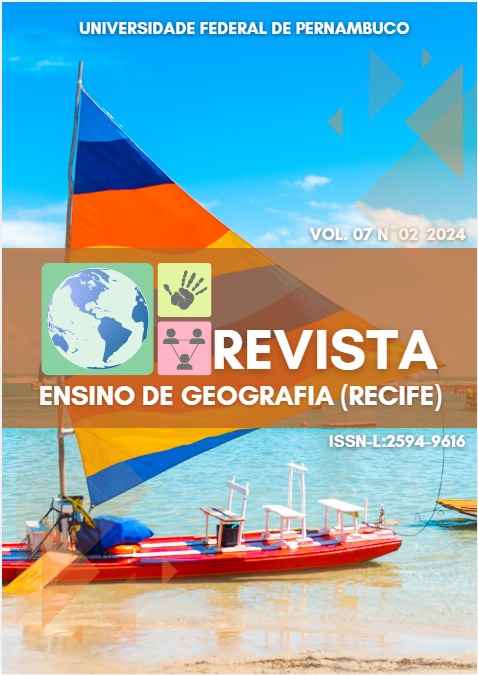Considerations about the importance of the Pedagogical Project of the Course (PPC) for the initial training of teachers: enfase for licenses in geografia
DOI:
https://doi.org/10.51359/2594-9616.2024.263931Keywords:
political pedagogical project, geography teaching, teacher trainingAbstract
This work addresses questions about the training of Geography teachers. Its main objective is to raise some reflections on the place of the University in the professionalization of teachers who work in basic education classrooms, especially in geographic education and the importance of PPC to guide teaching actions in teacher training. Using the dialectical method, and based on bibliographical review methodologies and application of questionnaires for teachers, we used as a study focus the undergraduate Geography course at the State University of Maranhão (UEMA). The result obtained through the application of questionnaires to teachers highlights that despite the PPC being a fundamental document in the promotion of a higher education course, it is still relatively little used in the academic routine of the undergraduate geography course.
Keywords: Pedagogical political project; geography teacher; teacher training
References
BLOISE, Denise Martins. A importância da metodologia científica na construção da ciência. Revista Científica Multidisciplinar Núcleo do Conhecimento. Ano 05, Ed. 06, Vol. 06, pp. 105-122. Junho de 2020.
BRASIL. Conselho Nacional de Educação/Conselho Pleno. Parecer CNE/CP n. 9, de 08 de maio de 2001.
BRASIL. Lei nº 9.394; Diretrizes básicas para a educação. 20 de dezembro de 1992.
CALLAI, H. C. A formação do profissional da Geografia: o professor. Ijuí: Editora UNIJUÍ, 2013.
CARLOS, Ana Fani A.; OLIVEIRA, Ariovaldo Umbelino de. Reformas no mundo da educação: parâmetros curriculares e geografia. 2013.
CAVALCANTI, Lana de Souza. A geografia escolar e a cidade: ensaios sobre o ensino de geografia para a vida urbana cotidiana. Campinas, SP: Papirus, 2012.
CAVALCANTI, Lana de Souza. Geografia, escola e construção do conhecimento. Campinas: Papirus, 1998.
DEMO, Pedro. Política social, educação e cidadania. Papirus Editora, 1994.
LACOSTE, Yves. A geografia – isso serve, em primeiro lugar para fazer guerra. Tradução Maria Cecília França – Campinas, SP: Papirus, 1988.
LIBÂNEO, José Carlos. A aprendizagem escolar e a formação de professores na perspectiva da psicologia histórico-cultural e da teoria da atividade. Educar, Curitiba, nº 24, 2004.
LIMA, Michele F.; ZANLORENZI, Claudia M.P.; PINHEIRO, Luciana R. A função do currículo no contexto escolar. 1 ed. Curitiba: Inter saberes, 2012.
LOPES, Claudivan Sanches; Nídia Nacib PONTUSCHKA. "Estudo do meio: teoria e prática." Geografia (Londrina) 18.2 (2009): 173-191.
MARCONI, Marina de Andrade; LAKATOS, Eva Maria. Fundamentos de metodologia científica. 5. ed.-São Paulo: Atlas, 2003.
ZAINKO, M. A. S. Políticas de formação do professor e qualidade da educação básica: o projeto pedagógico das licenciaturas, os condicionantes da qualidade, o perfil dos professores e o desempenho dos estudantes no Estado do Paraná: análise dos projetos políticos pedagógicos de cursos de licenciaturas. Universidade Federal do Paraná, Pró-reitoria de Graduação e Educação Profissional, Curitiba: UFPR, 2015.
Downloads
Published
How to Cite
Issue
Section
License
Copyright (c) 2024 Francisco de Oliveira Viana, Lucas Silva Carvalho, Regina Célia de Castro e Pereira

This work is licensed under a Creative Commons Attribution 4.0 International License.
Authors who publish with this journal agree to the following terms:- Authors retain copyright and grant the REVISTA ENSINO DE GEOGRAFIA (RECIFE) right of first publication with the work simultaneously licensed under a Creative Commons Attribution NonCommercial International 4.0 (CC BY-NC) that allows others to share the work with an acknowledgement of the work's authorship and initial publication in this journal.
- Authors are able to enter into separate, additional contractual arrangements for the non-exclusive distribution of the journal's published version of the work (e.g., post it to an institutional repository or publish it in a book), with an acknowledgement of its initial publication in this journal.
- Authors are permitted and encouraged to post their work online (e.g., in institutional repositories or on their website) prior to and during the submission process, as it can lead to productive exchanges, as well as earlier and greater citation of published work.



